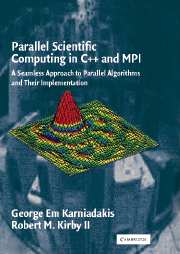 Parallel Scientific Computing in C++ and MPI
Parallel Scientific Computing in C++ and MPI Book contents
- Frontmatter
- Contents
- Preface
- Acknowledgments
- 1 Scientific Computing and Simulation Science
- 2 Basic Concepts and Tools
- 3 Approximation
- 4 Roots and Integrals
- 5 Explicit Discretizations
- 6 Implicit Discretizations
- 7 Relaxation: Discretization and Solvers
- 8 Propagation: Numerical Diffusion and Dispersion
- 9 Fast Linear Solvers
- 10 Fast Eigensolvers
- A C++ Basics
- B MPI Basics
- Bibliography
- Index
3 - Approximation
Published online by Cambridge University Press: 05 October 2013
- Frontmatter
- Contents
- Preface
- Acknowledgments
- 1 Scientific Computing and Simulation Science
- 2 Basic Concepts and Tools
- 3 Approximation
- 4 Roots and Integrals
- 5 Explicit Discretizations
- 6 Implicit Discretizations
- 7 Relaxation: Discretization and Solvers
- 8 Propagation: Numerical Diffusion and Dispersion
- 9 Fast Linear Solvers
- 10 Fast Eigensolvers
- A C++ Basics
- B MPI Basics
- Bibliography
- Index
Summary
Two of the most common tasks in scientific computing are interpolation of discrete data and approximation by known functions of the numerical solution, the source terms, and the boundary or initial conditions. Therefore, we need to perform these tasks both accurately and efficiently. The data are not always nicely distributed on a uniform lattice or grid, and thus we must learn how to manage these situations as well. We often use polynomials to represent discrete data because they are easy to “manipulate,” that is, differentiate and integrate. However, sines and cosines as well as special functions called wavelets are very effective means to perform interpolation and approximation, and they have very interesting properties.
In this section, we will study various such representations and their corresponding C++ implementations. We consider cases where the data are just sufficient to determine exactly the representation (deterministic case) as well as cases where the data are more than the information needed (overdetermined case).
Finally, we will present a more detailed discussion of MPI_Send and MPI_Recv, the two fundamental building blocks of MPI.
- Type
- Chapter
- Information
- Parallel Scientific Computing in C++ and MPIA Seamless Approach to Parallel Algorithms and their Implementation, pp. 84 - 187Publisher: Cambridge University PressPrint publication year: 2003


